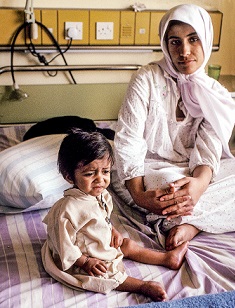Using AI to control energy for indoor agriculture
30 September 2024
Published online 23 September 2015
A cholera task force has been established in Iraq following an outbreak which experts fear will spread.

© Iraq / Alamy Stock Photo
The Iraq Ministry of Health declared the outbreak on Sunday in parts of west Baghdad, Najaf, a city about 160km south of the capital and Diwaniya, in the centre-south of Iraq.
The ministry has reported six deaths and at least 38 other infections, with some experts putting the number of infections at more than 70.
Cholera can be fatal within hours if not treated. A spokesman for UNICEF in Iraq told Nature Middle East there had been a steady increase in suspected and confirmed cases since the first case on September 8th. He said the most likely source [of the outbreak] was water brought into these areas via water tankers. Local water systems are in poor condition due to the conflict.
“In areas with poor water and sanitation services, the disease is likely to spread easily if the source of introduction is not stopped and community measures to impair transmission are slow,” he said.
In a statement, Adela Hamoud, the Iraqi minister of health, warned the number of cases would increase over the next few days.
Public health practitioner Annie Sparrow says that Iraq’s water and sewerage systems have been compromised by years of war and neglect. “I’d be surprised if there’s only 70 infected and six dead,” she adds.
Altaf Musani, the World Health Organisation’s (WHO) acting representative for Iraq, said WHO is coordinating the task force with the ministry of health, UNICEF and other health partners. They had collected 1,000 Rapid Diagnostic Tests for cholera and supplied 17 Diarrhoeal Disease Kits – enough to treat almost 7,000 moderate cholera cases and 1,700 severe cases.
The spokesman for UNICEF said the response would include chlorinating the most vulnerable water sources and providing bottled water, oral rehydration solution and hygiene awareness to communities and local clinics.
Efforts will be hampered by the ongoing conflict and the displacement of 3.2 million people.
Musani said the shortage of chlorine for water purification; the establishment of cholera treatment centres and addressing the availability of safe drinking water were major challenges to the response.
The WHO said at present there was no significant risk of international spread.
doi:10.1038/nmiddleeast.2015.172
Stay connected: